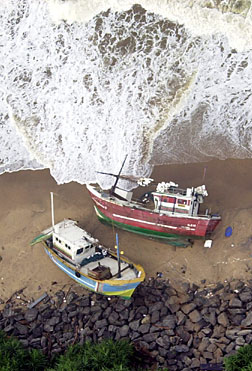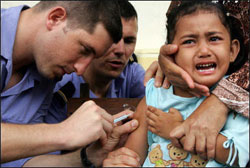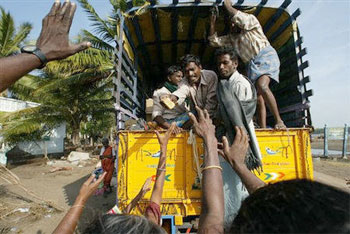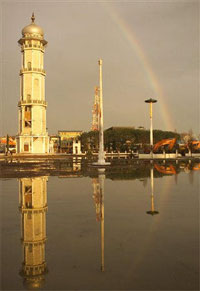|









|
|
- Three questions….to
Jacques Gaillot
Solidarity with the victims of the Tsunami
has been exceptional all over the world. According to the humanitarian
associations this has never been seen before. Do you think that
this tragedy has paradoxically wakened up to a new consciousness
of international solidarity?

|
Yes it did. After the devastating wave
that took so many lives, another huge wave has surged, a wave
of solidarity. The human family has shown the best it has: compassion.
Facing the extent of the disaster, we have opened our heart and
our hands. This sudden awareness makes us rejoice. We are able
to put the human being at the center of our attention. |
-
- In spite of some outdoing and strategies
in helping the people, this globalization of solidarity will
mark our time as if humanity understood that the future belongs
to solidarity. I see this as an encouraging sign.
-
- In regard to such a disaster,
many wonder if their gift (necessarily small compared to the
disaster size) will be useful. The question that many don't dare
to raise is how much I should give and to who? What do you answer
them?
-
|
The little rivers make the big ones.
My own gift adds to the other gifts. It is useful. I can only
trust the organizations to which I give. |

|
-
- It is up to every one to decide
how much depending on his financial situation. It is not enough
to give by duty, or with regret or to have a good conscious.
What is important is to give with one's heart and if possible
with joy. But it is not enough. Solidarity is a long-term process.
We have to make known among the wealthy countries that the money
used for extra-armaments and for war has to go to the victims
of the disaster.
-

|
We should also support the cancellation
of the debt of the countries that suffered from the disaster:
Sri Lanka, India, Indonesia, Thailand, and Malaysia. A debt that
amounts up to 300 billions of dollars! |
-
- In the very first days of the
catastrophe, the most immediate and tangible help was coming
from religious associations (Buddhists, Moslems, Christians).
Do you think that religion has a specific place in organizing
solidarity in such disaster?
-

|
We saw that religious groups were on
the location of the tragedy. Since the first hours there has
been a local help, with all people working together. In emergency
and with very few means, well-established local associations
have already provided the first help and have tried to restore
a more normal life. This is invaluable!
I saw on the television, religious sisters caring for the sick
and bringing food. A Buddhist temple was opened to the victims. |
-
- As religious groups they have their
say on the difficult organization of solidarity.
(Interviewed by Olivier Galzi)
|


